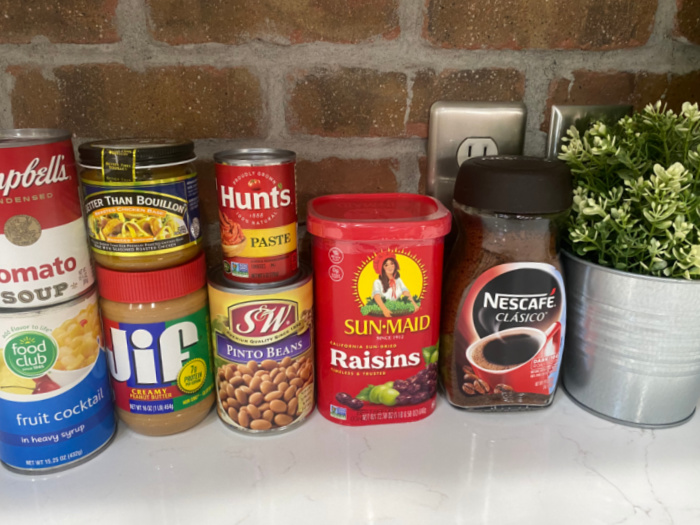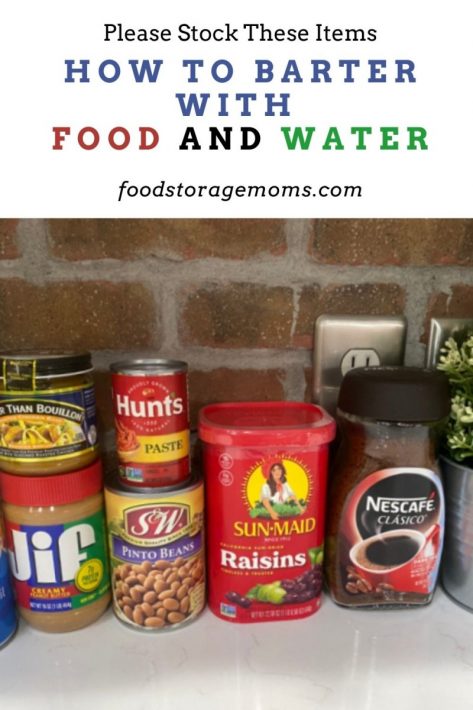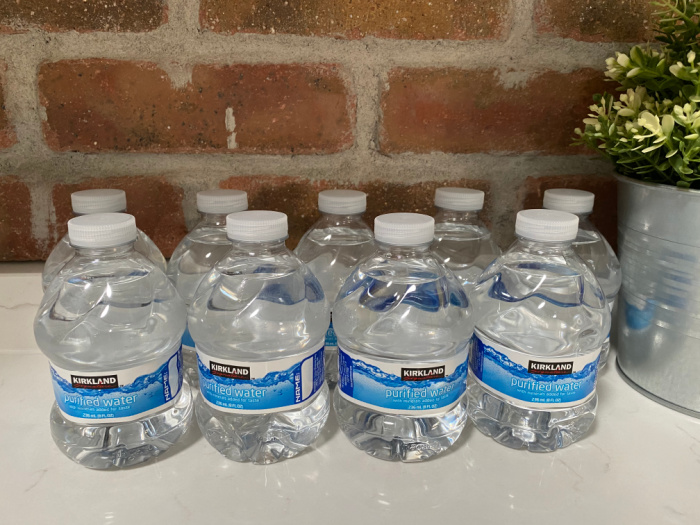
Bartering is an ancient practice that has existed for thousands of years and is still used today in certain countries of the world. Did you know that during the Great Depression, many families didn’t have the money for food and supplies, so they relied heavily on a bartering system to meet their everyday needs? Often, bartering can include trading skills rather than products. Today, let’s discuss how to barter with food and water.
How to Barter with Food and Water
A natural disaster or an economic collapse could leave you in a situation where you can’t use cash to get your family’s needs. Having the right items to barter during this time will be critically important. Prepping prompts us to plan ahead and try to have what is needed in times of crisis, no matter what the emergency might be. With climate change and the shifting of food and water resources, staying ahead of the emergency preparation game has been a challenge.

Add in the issues of supply chain disruptions, some areas of the country seem to be experiencing a “perfect storm” when it comes to preparation. Clean water scarcity has become a real threat as many states still deal with drought while others experience wildfires and floods. Having sufficient water to properly hydrate, cook meals, handle personal hygiene, and perform limited laundry chores is critical.
I’ve been telling my readers for years to try and grow their own food to save money and to have provisions when others might not. For obvious reasons, food and water will become some of the most sought-after commodities during that scenario, so having a stockpile of the sought-after barter items could genuinely benefit you. Here are some ideas for successful bartering using stockpiled food and water, some of the best barter items, so you can get what you need most for day-to-day living or survival.
Things to Consider When Stockpiling Food
When you’re thinking about the right foods that you should consider stockpiling, there is a proven approach that you need to take into account:
- For starters, you should stockpile foods with a longer shelf life because you never know how long it will be before those items become necessary for you and others. It could be tomorrow, or it could be months or years from now. You never know when the family breadwinner has an accident, gets caught up in a layoff, or heaven forbid, dies from an illness.
- That’s why preppers gather non-perishable food items that will provide them with optimal food quality long after an emergency arises. Having extra food supplies provides your family with the leverage they need.
- You also need to consider getting food products that are cost-effective and won’t cost you too much money as you stockpile. Consider purchasing foods that are a great value/discount or can be bought in bulk to save you even more money.
- Following a major disaster, there will be a higher demand for these items, and their value will increase as the prices at the store increase. (That’s if grocery stores are still even an option.)
Lastly, you may need to transport these goods. Avoid oversized, bulky food items, especially if you lack storage space. Focus on smaller, lightweight food items that are easy to store and more convenient to transport.
Drinking Water Purification and Filtering Methods
I buy these tiny water bottles at Costco because they are small, and I can hand them out to visitors when needed. As far as I remember, they come with 48 bottles in the case and cost about $10.00. They’re unsuitable for long-term water storage, but if you rotate them, they work great for short-term storage and the need for convenient water consumption. Each bottle has 8 ounces. They now have a larger 80-item package, so check on that.

Drinking water is sure to be the hottest item on everyone’s list following a major crisis because being caught without it could prove deadly in just a few days. This is why having an abundance of pure drinking water that you could barter with will only prove more valuable than gold during this period. You could always rely on bottled water, but there’s also the fact that it’s bulky and takes up a lot of space.
- Ensure you have several different filtering methods to drink sanitized water.
- You can get deathly sick if you consume water with bacteria and other infectious sediments.
- Everyone else will also be looking for clean water, so stocking up on filters and water purifiers is wise.
- Purification tablets, Berkey Filter Bottles, and Aquamira Drops are related items you should look into. I also like the PortaWell water filter system. I did a post about that product some time ago. Check my archive for more information since their product is portable, filters a higher volume of water, and filters more quickly since it is a battery-powered pump-driven system and not based on gravity.
- If you’re planning on hunkering down in your home following a disaster and storage space isn’t an issue, stocking up on plenty of 5-gallon water containers is one option. We have some larger 160- and 250-gallon storage tanks, too. I use a product called WaterPreserver to treat all our stored water. It is suitable for five years, saving much time and water rather than the every-six-month treatment with unscented bleach.
- There are also 55-gallon water barrels that could stretch your family’s drinking water supply, but there’s the inconvenience that they are heavy and nearly impossible to transport.
Food Items To Barter
Following a disaster, there may come a point when your local grocery store jacks up its prices on certain food items, or they may run out of just about everything. There’s also the possibility that all the stores in your area could be closed indefinitely. You need to have food storage as part of your overall self-reliance plans, but storing foods not only to feed your family but also items that you’d be willing to barter with could make a real difference during an emergency. These are just a few items that you should consider.
- Nonperishable food items (canned vegetables like carrots, green beans, and peas; fruits like peaches, applesauce, apricots, and pears; and meats like chicken breasts, tuna, beef, and turkey)
- Dried goods (beans, noodles, rice, pasta, and popcorn)
- Emergency food supplies, as outlined in my posts. I have shelves full of freeze-dried foods of all kinds. They come in #10 cans and also smaller ones called Pantry cans. I love their long shelf life, their ease of use, and the nutrition and flavor provided.
- Fresh produce (straight from your garden)
- Eggs
- Jerky and smoked meats
- Popular snacks (including Lay’s potato chips, Oreos, Hostess Cupcakes, etc)
- Peanut butter
- Grain products like wheat, barley, and rice
Morning and Afternoon Caffeine
Could you imagine waking up without your usual cup of coffee? Most people wouldn’t make it past the first week. Coffee and tea will barter nicely, but don’t forget the coffee filters!
Then, there’s the dose of afternoon caffeine that people rely on to carry them through the rest of the day. Stocking up on soda pop and energy drinks will also give you the bargaining chips you need to barter.
Candy and Other Sweets
Don’t kid yourself if you think this food category is something everyone could drop cold turkey. Some people would be willing to give up almost anything to obtain some hard candy and other sweets. Candy and sweets will be priceless following a major disaster, and you may be able to barter candies and other sweets for critical supplies that your family desperately needs.
You should consider chocolates, peanut brittle, nuts, popcorn, and more. Also, items to top off a breakfast meal like sugar, cocoa, and syrup. This is an essential tip regarding how to barter food and water.
Don’t Forget the Kitchen Staples
Returning to normalcy following a major disaster or economic collapse will be how many people try to cope with their new everyday circumstances. Most people (myself included) enjoy eating to deal with their feelings, and there’s no better way to do so than indulging in delicious baked goods or devouring a satisfying, hearty meal.
After a disaster, it won’t be long before everyone runs out of the necessary ingredients to continue enjoying their favorite baking recipes or eating meals that have flavor. You can rest assured that kitchen staples will be highly sought after. Here are several items that should be high on the list for you to seek as bartering items or items you may need where your food and water could come in handy:
- Canning salt
- Pepper
- Sugar
- Crisco and cooking oil
- Bouillon
- Spices (stored in glass jars)
- Vinegar
- Honey
- Baking soda
- Baking powder
- All-purpose four
- Yeast
- Powdered milk
What other critical items can I barter that aren’t food or water-related?
Consider stocking up on these items as a bartering participant to add to your bartering resources since most people won’t be as well prepared as you are:
- Toilet Paper
- Batteries of all kinds and a flashlight or two for each family member
- Weapons and Ammunition (be careful with this one; we don’t want to advertise what we have for safety)
- Baby Wipes
- Dental care items like dental floss, toothpaste, and toothbrushes
- First-aid items like ointment, bandages, gauze, cotton swabs, suntan lotion, and aloe vera
- Other over-the-counter medical supplies for headaches, nausea, insomnia, and vitamin and mineral supplements
- Cigarettes
- Paper goods and kitchen items like pots and pans, matches, utensils
- Personal hygiene items, including those special time of month items for the ladies
- Soap products of all kinds so you can wash your hands, clothes, and dishes
Final Word
Nobody likes to think about what would happen if a major disaster struck their area. That’s why it’s essential for you to stockpile the right kinds of food now for your food security and to take care of your family, but also provide yourself with something you could barter with when money becomes irrelevant. Do you know how to trade/barter food and water? Let me know from your personal experience what you’d suggest to my readers as they try to be prepared. May God bless this world, Linda
The post How to Barter with Food and Water appeared first on Food Storage Moms.
from Food Storage Moms
No comments:
Post a Comment